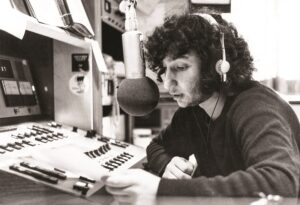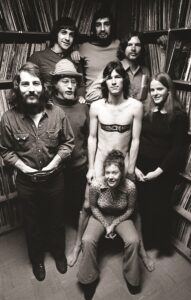Journalist and documentarian Bill Lichtenstein has uncovered major investigative scoops, won a Peabody Award and a Guggenheim Fellowship, and received a Special Recognition honor from the Mass. Association for Mental Health.
His career in media began when he was 14 as a volunteer at Boston’s WBCN radio station in 1970.

“It was an amazing place to be because it felt like history was happening every day,” Lichtenstein says.
The Wellfleet Public Library is hosting a free screening on Saturday, March 25 of Lichtenstein’s award-winning documentary WBCN and the American Revolution, which premiered in 2019 at the DC Independent Film Festival and aired on PBS in 2021.
For Outer Cape residents who spent formative years in Boston during the late 1960s and 1970s, the film is sure to strike a chord. WBCN rode the city’s youth-driven counterculture wave with a mix of trendsetting rock and roll, hard-hitting news coverage, community-oriented programs, and revolutionary political action.
“We learned that getting people together to speak collectively with one voice could have a tremendous impact,” says Lichtenstein. On a good day, 104.1 FM could reach 100,000 people in Greater Boston. “Today, anybody with a cell phone can potentially reach half a billion people,” he notes, adding that he sees reflections of BCN in certain pockets of social media. Whatever their medium, he says, creators and activists can cut through the noise when they use their platforms “in a way that does what BCN did, which was to build community, engage people, and give a voice to those who don’t have one.”
WBCN was groundbreaking in many ways, not least in launching the careers of many pioneering female DJs — although a 1970 public service announcement in which the station’s Charles Laquidara called women “chicks” led the feminist socialist collective Bread and Roses to let loose a peep of baby chicks at the station in protest.
In the book accompanying the documentary, Laquidara claims there were 40 birds. “I was right there, and it was about 10,” says Deborah Ullman of Eastham, who was doing ad sales for the station at the time and occasionally filling in on air. After the chick protest, Ullman became the station’s first full-time female DJ, occupying her 6 a.m. slot at WBCN for the next year and a half.
“It was so much fun,” Ullman says. “I had to get up at four in the morning because I was living in Hingham, and I didn’t mind it at all.” Rubbing shoulders with musical idols helped. Once, folk legend Dave Van Ronk arrived at Ullman’s morning show with a “bevy of young women” and guest DJed for half an hour before the group left — “no more sober than when they arrived,” Ullman recalls.

Lichtenstein was inspired to pursue the film project by concern about the dwindling culture of public protest in the wake of 9/11. He wanted to reanimate the history of “how media can help create social change, and the imperative of artists, musicians, and all of us to speak up and dissent,” he says. But there was one problem: in its counterculture heyday, WBCN didn’t keep tape recordings of its broadcasts.
Lichtenstein had to come up with another plan. “I had this crazy idea, before Facebook had even been launched, of having people share stuff over the internet,” he says. After launching a Commonwealth-wide call for material, Lichtenstein and his team ended up with thousands of images and cassette recordings of WBCN airtime from personal archives. One woman stopped by his office with a meticulously labeled scrapbook from a WBCN softball game she had attended. A successful Kickstarter campaign helped fund the interviewing, compiling, and editing required to put the documentary together.
“That became the gestalt of the project in a very BCN-like way,” Lichtenstein says. “All the material was gathered from listeners and mostly supported by crowdfunding of people who love the station.”
Instead of writing the story and then searching for archival ephemera to match a preset narrative, the documentarians took the opposite approach.
“We started with nothing,” Lichtenstein says. “It was almost like an archeological dig.” They found a tape recording of Patti Smith performing her first-ever live radio concert at the station — which turned out to be an obscenity-laden tour de force — and set out to locate photographs of it. Once tape and images were secured, the performance could appear on the storyboard. The anecdotes that made it into the film were the ones that could be supported with the most multimedia material.
It turned out to be more successful than Lichtenstein imagined. “There was clearly more material than we could fit in the film,” he says. The book allowed for a deeper dive into WBCN history — less “experiential” than the documentary and more image-driven. Editors at MIT Press recommended dividing the book into chapters, which ended up providing the structure for the film.
Lichtenstein has built a reputation of journalistic integrity and creativity through his media company, especially in the realm of mental health reporting. His current investigative documentary project, Broken, uncovers the failures of the child welfare system in the Commonwealth and nationwide. WBCN and the American Revolution is unique among his works for its subject matter, if not its ethos.
It’s also unique for Lichtenstein from a personal perspective. Combing through the trove of material from WBCN’s radical years, he says, “was probably the most purely fun thing I’ve ever done and will ever do professionally.”
Radical Voices on the Air
The event: A screening of Bill Lichtenstein’s documentary WBCN and the American Revolution
The time: Saturday, March 25, 2 p.m.
The place: Wellfleet Public Library, 55 West Main St.
The cost: Free; see wellfleetlibrary.org for information
